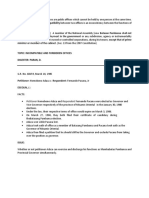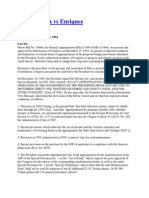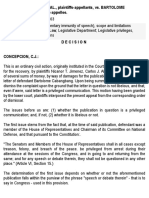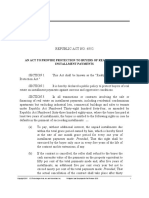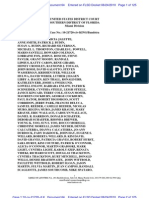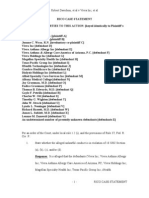Dimaporo Vs Mitra Digest
Dimaporo Vs Mitra Digest
Uploaded by
pawchan02Copyright:
Available Formats
Dimaporo Vs Mitra Digest
Dimaporo Vs Mitra Digest
Uploaded by
pawchan02Original Title
Copyright
Available Formats
Share this document
Did you find this document useful?
Is this content inappropriate?
Copyright:
Available Formats
Dimaporo Vs Mitra Digest
Dimaporo Vs Mitra Digest
Uploaded by
pawchan02Copyright:
Available Formats
Dimaporo vs. Mitra (1991) MOHAMMAD ALI DIMAPORO, petitioner vs. HON. RAMON V. MITRA, JR.
, Speaker, House of Representatives, and HON. CAMILO L. SABIO Secretary, House of Representatives, respondents
Ponente: Davide, Jr., J. Facts: Petitioner Dimaporo was elected Representative for the Second Legislative District of Lanao del Sur during the 1987 congressional elections. In January 1990, he filed a Certificate of Candidacy for the position of Regional Governor of the ARMM with the Comelec. Upon being informed of this development, respondents Speaker and Secretary of the House of Representatives (HOR) excluded petitioner s name from the Roll of Members of the HOR pursuant to Sec. 67, Art. IX of the Omnibus Election Code (BP Blg. 881)1 enacted in 1985. He was excluded from all proceedings of the House, was not paid the emoluments due his office, and his office suites were occupied by other persons. When he lost his bid for the gubernatorial race, petitioner expressed his intention to resume performing his duties and functions as an elected Member of Congress. He is now claiming that Sec. 67, Art. IX of BP Blg. 881 is not operative under the present Constitution which provides specific grounds by which the term of members of the House can be shortened2. Issues: 1. 2. W/N Sec. 67, Art. IX of BP Blg. 881 is operative under the 1987 Constitution W/N the respondent Speaker and/or respondent Secretary by administrative act could exclude petitioner from the rolls of the HOR
Held/Ratio: 1. Petitioner No. The provision cuts short the term of office of a Member of Congress. Respondents Yes. Sec. 67, Art. IX of BP Blg. 881 is still operative under the present Constitution as the voluntary act of resignation contemplated in the said provision falls within the term voluntary renunciation of office in Sec. 7(2), Art. VI of the Constitution. Court Yes. Term is different from tenure of office. The term of office prescribed by the Constitution may not be extended or shortened by the legislature. However, the period during which an officer actually holds the office (tenure) may be affected by circumstances within or beyond the power of said officer. Tenure may be shorter than the term or it may not even exist at all. Under the questioned provision, when an elective official covered thereby files a certificate of candidacy for another office, he is deemed to have voluntarily cut short his tenure, NOT his term. The term remains and his successor, if any, is allowed to serve its unexpired portion. Sec. 2, Art. XI of the Constitution provides that all public officers to the exclusion of the President, Vice-President, Members of the Supreme Court, Members of the Constitutional Commissions, and the Ombudsman may be removed from office as provided by law. This clearly recognizes that the 4 grounds found in Art. VI of the Constitution by which the tenure of a Congressman may be shortened are NOT
Under the rule expression unius est exclusion 3 alterius , the statute is repugnant to the pertinent constitutional provisions since it provides for the shortening of a congressman s term of office on a ground not provided for in the present Constitution. If it were the intent of the framers to include the provisions of Sec. 67, Art. IX of BP Blg. 881, they should have incorporated it in the 1987 Constitution.
1
The grounds mentioned in the Constitution cannot be exclusive since there are other modes of shortening the tenure of office of a Member of Congress such as resignation, death, and conviction of a crime which carries a penalty of disqualification to hold public office which are not included in the enumeration.
Sec. 67, Art. IX of the Omnibus Election Code (BP Blg. 881): Any elective official whether national or local running for any office other than the one which he is holding in a permanent capacity except for President and Vice-President shall be considered ipso facto resigned from his office upon the filing of his certificate of candidacy.
2
Sec. 7(2), Art. VI: Voluntary renunciation of office. Sec. 13, Art. VI: Forfeiture of his seat by holding any other office or employment in the government or any subdivision, agency or instrumentality thereof, including government-owned or controlled corporations or subsidiaries. Sec. 16(3), Art. VI: Expulsion as a disciplinary action for disorderly behavior. Sec. 17, Art. VI: Disqualification as determined by resolution of the Electoral Tribunal in an election contest.
3
The expression of one thing excludes all others.
He cannot be said to have forfeited his seat as it is only when a congressman holds another office or employment that forfeiture is decreed, pursuant to Sec. 13, Art. VI of the Constitution.
Petitioner s filing of a Certificate of Candidacy is an act of resignation which estops him from claiming otherwise because he is presumed to be aware of existing laws.
exclusive. The legal maxim should not be applied with the same rigor in construing a constitution as a statute because the maxim is only a rule of interpretation and not a constitutional command. It serves only as an aid in discovering legislative intent where such intent is not otherwise manifest. Petitioner failed to discern that the purpose of the statutory provision is not to cut short the term of office of public officials but rather to ensure that such officials serve out their entire term of office by discouraging them from running for another public office. Sec. 67, Art. IX of BP Blg. 881 makes it clear that should incumbent public officials fail in their candidacy for another office, they cannot go back to their former position. This is in perfect consonance with the constitutional edict that all public officials must serve the people with utmost loyalty and not trifle with the mandate which they have received from their constituents. The ground for forfeiture in Sec. 13, Art. VI of the Constitution is different from the forfeiture decreed in Sec. 67, Art. IX of BP Blg. 881, which is actually a mode of voluntary renunciation of office under Sec. 7, Art. VI of the Constitution. As discussed by Constitutional Commissioners, the filing of the certificate of candidacy is already an overt act of an intention to relinquish the office currently held. Once the certificate is filed, the seat is forever forfeited and nothing save a new election or appointment can restore the ousted official. A public office is a public trust. It is created for the interest and benefit of the people. As such, the holder of such an office is subject to regulations and conditions as the law may impose and he cannot complain of any restrictions which public policy may dictate on his office.
2. Petitioner No. Respondents so-called administrative act cannot be justified as an interpretation of the Constitutional provision on voluntary renunciation of office because only the courts can interpret laws. Respondents Yes. Their questioned administrative act is a mere ministerial act which did not involve any encroachment on judicial powers. Court Yes. Since the legal effects of filing a certificate of candidacy have already been spelled out in Sec. 67, Art. IX of BP Blg. 881, respondents cannot be said to have indulged in any statutory interpretation. Both of them perform ministerial functions as administrative officers and it was their duty to remove petitioner s name from the Roll considering the unequivocal tenor of Sec. 67, Art. IX of BP Blg. 881. They cannot refuse to perform their duty on the ground of an alleged invalidity of the statute imposing such duty because it might hinder the transaction of public business. Officers of the government from the highest to the lowest are creatures of the law and are bound to obey it.
You might also like
- Cover Sheet For Application at Company Registration and Monitoring DepartmentDocument2 pagesCover Sheet For Application at Company Registration and Monitoring Departmentpawchan02100% (4)
- Montejo Vs Comelec Case DigestDocument2 pagesMontejo Vs Comelec Case DigestFranco AguiluzNo ratings yet
- MANILA PRINCE HOTEL Vs GOVERNMENT SERVICE INSURANCE SYSTEMDocument2 pagesMANILA PRINCE HOTEL Vs GOVERNMENT SERVICE INSURANCE SYSTEMJa Ru75% (4)
- Defensor-Santiago v. COMELECDocument2 pagesDefensor-Santiago v. COMELECKev Nambs50% (2)
- Affidavit (Delayed Registration of Marriage)Document2 pagesAffidavit (Delayed Registration of Marriage)pawchan02No ratings yet
- Court TestimonyDocument5 pagesCourt TestimonyHarrison sajor0% (1)
- Condominium ActDocument2 pagesCondominium ActNatsu DragneelNo ratings yet
- Dimaporo V MitraDocument4 pagesDimaporo V MitraWranny VerameNo ratings yet
- 18 Jimenez v. CabangbangDocument2 pages18 Jimenez v. CabangbangzeeNo ratings yet
- Jalojos (Digest)Document1 pageJalojos (Digest)Anonymous joeguHlNo ratings yet
- Ceniza Vs ComelecDocument1 pageCeniza Vs ComelecVanessa Evans CruzNo ratings yet
- Letter of Associate Justice Reynato S. Puno, A.M. No. 90-11-2697-CA, A.M. No. 90-11-2697-CA, June 29, 1992 Case DigestDocument1 pageLetter of Associate Justice Reynato S. Puno, A.M. No. 90-11-2697-CA, A.M. No. 90-11-2697-CA, June 29, 1992 Case DigestAce Lawrence AntazoNo ratings yet
- Joya Vs PCGGDocument4 pagesJoya Vs PCGGRmLyn MclnaoNo ratings yet
- 20.1 People vs. Gacott DigestDocument1 page20.1 People vs. Gacott DigestEstel TabumfamaNo ratings yet
- Angara V Electoral CommissionDocument2 pagesAngara V Electoral CommissionEB Molina100% (1)
- Reyes Vs BagatsingDocument1 pageReyes Vs Bagatsingroland deschainNo ratings yet
- Tobias V Abalos 239 SCRA 106 G.R. No. L-114783 December 8, 1994Document2 pagesTobias V Abalos 239 SCRA 106 G.R. No. L-114783 December 8, 1994Evelyn Bergantinos DMNo ratings yet
- Gonzales Vs Comelec Case DigestDocument2 pagesGonzales Vs Comelec Case DigestGayle AbayaNo ratings yet
- Case Digests Political LawDocument1 pageCase Digests Political LawMczoC.MczoNo ratings yet
- Sanidad Vs Comelec DigestDocument2 pagesSanidad Vs Comelec DigestMarianne de VeraNo ratings yet
- Ceniza v. COMELECDocument3 pagesCeniza v. COMELECJude FanilaNo ratings yet
- Matibag Vs BenepayoDocument2 pagesMatibag Vs BenepayoMichael John B. AndohuyanNo ratings yet
- Dimaporo vs. Mitra DigestDocument1 pageDimaporo vs. Mitra DigestAnonymous m9b4rxjNo ratings yet
- Imbong V ComelecDocument13 pagesImbong V ComelecAnnamaAnnamaNo ratings yet
- Joya vs. PCGGDocument2 pagesJoya vs. PCGGHaelSer100% (2)
- Daza vs. Singson (G.R. No. 86344)Document1 pageDaza vs. Singson (G.R. No. 86344)Mt. CarmelNo ratings yet
- Delegation of Power People Vs VeraDocument2 pagesDelegation of Power People Vs VeraRuss TuazonNo ratings yet
- Petitioner Homobono Adaza and Respondent Fernando Pacana Were Elected As Governor andDocument5 pagesPetitioner Homobono Adaza and Respondent Fernando Pacana Were Elected As Governor andzeynNo ratings yet
- Guingona Vs Gonzales GR No. 106971 OCT. 20, 1992Document2 pagesGuingona Vs Gonzales GR No. 106971 OCT. 20, 1992Tew Baquial0% (1)
- Avelino Vs CuencoDocument2 pagesAvelino Vs CuencoKyla Ellen CalelaoNo ratings yet
- Bagong Bayani Vs Comelec-DigestDocument2 pagesBagong Bayani Vs Comelec-DigestMariz Galang83% (6)
- (CD) Montejo V ComelecDocument2 pages(CD) Montejo V ComelecRaineNo ratings yet
- Civil Liberties Unioin vs. Exec. Sec.Document2 pagesCivil Liberties Unioin vs. Exec. Sec.Julie AnnNo ratings yet
- Case Digest Republic Vs FelicianoDocument1 pageCase Digest Republic Vs FelicianoYakumaNo ratings yet
- 20) Defensor Santiago, Et. Al. vs. Guingona, Et. Al.Document3 pages20) Defensor Santiago, Et. Al. vs. Guingona, Et. Al.Jovelan V. EscañoNo ratings yet
- Pamatong Vs ComelecDocument1 pagePamatong Vs ComelecMr GawisNo ratings yet
- 003 - Digest Concepcion-Baustista vs. Salonga, G.R. 86439Document1 page003 - Digest Concepcion-Baustista vs. Salonga, G.R. 86439jeffreyNo ratings yet
- PHILCONSA Vs Enriquez: GR No. 113105, August 19, 1994 FactsDocument3 pagesPHILCONSA Vs Enriquez: GR No. 113105, August 19, 1994 FactsMer Manguera100% (1)
- Consing Vs Court of Appeals, G.R. No. 78272Document8 pagesConsing Vs Court of Appeals, G.R. No. 78272John Patrick GarciaNo ratings yet
- IBP v. ZamoraDocument2 pagesIBP v. ZamoraJilliane OriaNo ratings yet
- Mejoff Vs Director of Prisons 90 Phil 70Document17 pagesMejoff Vs Director of Prisons 90 Phil 70Lee SomarNo ratings yet
- Lansang vs. Garcia, 42 SCRA 448 (1971)Document59 pagesLansang vs. Garcia, 42 SCRA 448 (1971)Reginald Dwight FloridoNo ratings yet
- Estrada Vs DesiertoDocument9 pagesEstrada Vs DesiertoAnthonette MijaresNo ratings yet
- American Ins. Assn. v. Garamendi, 539 U.S. 396 (2003)Document37 pagesAmerican Ins. Assn. v. Garamendi, 539 U.S. 396 (2003)Scribd Government DocsNo ratings yet
- Defensor-Santiago vs. Comelec (G.R. No. 127325 - March 19, 1997) Davide, JR., J.: FactsDocument2 pagesDefensor-Santiago vs. Comelec (G.R. No. 127325 - March 19, 1997) Davide, JR., J.: FactsCharles Kevin Caparas AbsalonNo ratings yet
- Manila Prince Hotel v. Gsis Case DigestDocument2 pagesManila Prince Hotel v. Gsis Case DigestDarius Mark Bonggawen100% (16)
- 05 Atong Paglaum V COMELEC G.R. No. 203766 April 20 2013Document3 pages05 Atong Paglaum V COMELEC G.R. No. 203766 April 20 2013Katherine Janice De Guzman-PineNo ratings yet
- ITF Vs ComelecDocument2 pagesITF Vs ComelecRobert RosalesNo ratings yet
- G.R. No. 157509Document10 pagesG.R. No. 157509Klein CarloNo ratings yet
- Digest Gonzales Vs ComelecDocument1 pageDigest Gonzales Vs ComelecRafael Soro100% (1)
- People v. Vera, 65 Phil. 56 DigestDocument2 pagesPeople v. Vera, 65 Phil. 56 Digestreiner100% (1)
- Umali vs. Guingona G.R. No. 131124Document5 pagesUmali vs. Guingona G.R. No. 131124Teacher April CelestialNo ratings yet
- Case 5 in Re - Laureta and Maravilla, 148 SCRA 382 (1987) - SummaryDocument4 pagesCase 5 in Re - Laureta and Maravilla, 148 SCRA 382 (1987) - Summaryblude cosingNo ratings yet
- Digest - Dayao v. COMELECDocument2 pagesDigest - Dayao v. COMELECDagaerag Law Office100% (1)
- Jimenez v. Cabangbang (Aug. 3, 1966) Jimenez V CabangbangDocument8 pagesJimenez v. Cabangbang (Aug. 3, 1966) Jimenez V CabangbangRaymondNo ratings yet
- Frivaldo V Comelec 257 SCRA 727 DIGESTDocument1 pageFrivaldo V Comelec 257 SCRA 727 DIGESTPilyang Sweet100% (4)
- Chua Vs Civil Service Commission, 206 SCRA 65, G.R. No. 88979, February 7, 1992Document2 pagesChua Vs Civil Service Commission, 206 SCRA 65, G.R. No. 88979, February 7, 1992Gi NoNo ratings yet
- Planas vs. Comelec 49 Scra 105 January 22, 1973Document1 pagePlanas vs. Comelec 49 Scra 105 January 22, 1973JacobNo ratings yet
- Angara Vs ELECOM DigestDocument4 pagesAngara Vs ELECOM DigestCharlon Onofre100% (2)
- ARTURO M. DE CASTRO vs. JUDICIAL AND BAR COUNCIL (JBC) and PRESIDENT GLORIA MACAPAGAL - ARROYO, G.R. No. 191002, March 17, 2010, J. BERSAMINDocument1 pageARTURO M. DE CASTRO vs. JUDICIAL AND BAR COUNCIL (JBC) and PRESIDENT GLORIA MACAPAGAL - ARROYO, G.R. No. 191002, March 17, 2010, J. BERSAMINAntonio Reyes IVNo ratings yet
- Case Digest SUPRA For Gozales vs. COMELECDocument4 pagesCase Digest SUPRA For Gozales vs. COMELECChristian AribasNo ratings yet
- Abbas Vs Senate Electoral Tribunal (SET) 166 SCRA 651Document2 pagesAbbas Vs Senate Electoral Tribunal (SET) 166 SCRA 651Catherine Merilleno100% (1)
- Dimaporo VDocument3 pagesDimaporo VMaica AmanoNo ratings yet
- Dimaporo vs. Mitra Jr.Document3 pagesDimaporo vs. Mitra Jr.Rochedale ColasiNo ratings yet
- CIR v. CitytrustDocument2 pagesCIR v. Citytrustpawchan02No ratings yet
- Ra 6552Document3 pagesRa 6552pawchan02No ratings yet
- Mopia - in Re TerrellDocument1 pageMopia - in Re Terrellpawchan02No ratings yet
- Rule 63 Declaratory Relief and Similar Remedies Meaning of Declaratory ReliefDocument6 pagesRule 63 Declaratory Relief and Similar Remedies Meaning of Declaratory ReliefMeAnn Tumbaga100% (1)
- NICOLAS CO-PITCO v. PEDRO YULODocument2 pagesNICOLAS CO-PITCO v. PEDRO YULOKhate AlonzoNo ratings yet
- Massive Fraud in The CourtDocument6 pagesMassive Fraud in The CourtPW100% (1)
- Head Tenant ApplicationDocument6 pagesHead Tenant ApplicationDelali DmkNo ratings yet
- Conflict of LawsDocument15 pagesConflict of LawsAkash Shrivastava100% (3)
- United States v. Edward Michael Cody, 21 F.3d 1122, 10th Cir. (1994)Document5 pagesUnited States v. Edward Michael Cody, 21 F.3d 1122, 10th Cir. (1994)Scribd Government DocsNo ratings yet
- Republic of The Philippines Department of Labor and EmploymentDocument9 pagesRepublic of The Philippines Department of Labor and EmploymentGerry MalgapoNo ratings yet
- California Vs Iipay Nation of Santa YsabelDocument88 pagesCalifornia Vs Iipay Nation of Santa YsabelbrianpempusNo ratings yet
- Partnership VillanuevaDocument69 pagesPartnership VillanuevaKatherine Christy Rosal LigcubanNo ratings yet
- Bull VS United States DigestDocument4 pagesBull VS United States DigestJay RibsNo ratings yet
- Finals - Pubcorp (Digest) 2Document7 pagesFinals - Pubcorp (Digest) 2Jani MisterioNo ratings yet
- Email Correspondence Between Chintella and Comcast Part 2Document9 pagesEmail Correspondence Between Chintella and Comcast Part 2simalityNo ratings yet
- Paragon Properties of Costa Rica Second Amended ComplaintDocument125 pagesParagon Properties of Costa Rica Second Amended ComplaintMatthew Seth SarelsonNo ratings yet
- Alfonso v. Land Bank of The Phils. - MendozaDocument1 pageAlfonso v. Land Bank of The Phils. - MendozaDonna Mendoza100% (1)
- 03 Moran vs. Office of The President, G.R. No. 192957 (2014)Document9 pages03 Moran vs. Office of The President, G.R. No. 192957 (2014)Yaz CarlomanNo ratings yet
- ISSUE: Whether or Not The Decision of TheDocument19 pagesISSUE: Whether or Not The Decision of TheRodeleine Grace C. MarinasNo ratings yet
- Political Science Syllabus 2017Document4 pagesPolitical Science Syllabus 2017Navdeep NegiNo ratings yet
- United States v. Murray Francis Hardesty, 166 F.3d 1222, 10th Cir. (1999)Document2 pagesUnited States v. Murray Francis Hardesty, 166 F.3d 1222, 10th Cir. (1999)Scribd Government DocsNo ratings yet
- Project Report ON Doctrine of Estoppel Under The Indian Evidence Act, 1872Document17 pagesProject Report ON Doctrine of Estoppel Under The Indian Evidence Act, 1872hargunNo ratings yet
- Sriram Law Academy: Answers To Clat 2008Document10 pagesSriram Law Academy: Answers To Clat 2008muskan agarwalNo ratings yet
- Types of Finger-WPS OfficeDocument29 pagesTypes of Finger-WPS OfficeErick GempesaoNo ratings yet
- Complaint Against Crawford County Kansas Chief Judge Oliver Lynch and Judge Jennifer Brunetti - Dated February 01, 2020Document9 pagesComplaint Against Crawford County Kansas Chief Judge Oliver Lynch and Judge Jennifer Brunetti - Dated February 01, 2020Conflict Gate100% (1)
- Civil Servants Act 1973Document8 pagesCivil Servants Act 1973asimhakimNo ratings yet
- Lateo Vs People and 12. GMA Vs PeopleDocument3 pagesLateo Vs People and 12. GMA Vs PeopleCloieRjNo ratings yet
- Commissioner v. Jardin, G.R. No. 141834, July 30, 2007Document7 pagesCommissioner v. Jardin, G.R. No. 141834, July 30, 2007Alan Vincent FontanosaNo ratings yet
- Employee Invention AgreementDocument4 pagesEmployee Invention AgreementRocketLawyerNo ratings yet
- Searchable USDC Az RICO Case StatementDocument144 pagesSearchable USDC Az RICO Case StatementRobert Davidson, M.D., Ph.D.No ratings yet
- Constitution and By-Laws of The SLSU-CTE JLHSSBODocument5 pagesConstitution and By-Laws of The SLSU-CTE JLHSSBORomelo MuldezNo ratings yet



























